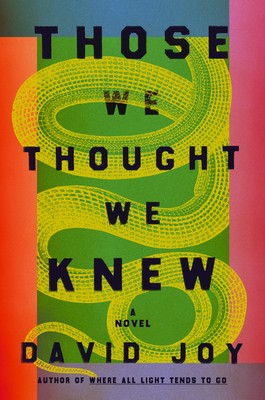I’m a bit of a fan girl when it comes to authors. At a recent writing conference, I realized I was standing behind Jeff Zentner as I waited to check into the hotel. I almost tapped him on the shoulder to say hi, but restrained myself. Later, when he was signing a book for me, I gushed, “I’ve used a few of your novels as comp titles. I love your work.” He was friendly and appreciative.
This weekend, I’m going to have another opportunity to fan girl. David Joy, author of “southern grit” books that tackle tough issues like racism and the opioid crisis, is coming to my little town to speak at our little creative writing awards ceremony. I can’t wait to hear what he has to say about Those We Thought We Knew, his most recent release. To prepare, of course I read it. And here’s what I think of this well crafted novel that tackles the issue of racism in a small North Carolina town.
The Premise
Set in a small town in the mountains of Western North Carolina, Those We Thought We Knew explores the issue of racism with brutal honesty. However, author David Joy tackles this incendiary topic with nuance and deliberation, being careful to include multiple perspectives.
A young black woman named Toya visits Sylva, NC for the summer. She wants to finish her graduate art thesis and learn more about her heritage while living with her maternal grandmother. At the same time, a high-ranking member of the Klu Klux Klan also travels to Sylva with unclear motives. An act of vandalism at the local courthouse stirs up protest, followed promptly by a murder and a separate assault. The residents of Sylva, including its longstanding Sheriff, must wrestle with complicated questions, including the meaning behind a Confederate statue at the center of town, and the unspoken differences between black and white residents that have gone unacknowledged for years.
What I liked
Like in When These Mountains Burn, Joy skillfully manipulates pace and multiple points of view to keep readers engaged. Tension fills nearly every page, and I finished the novel in just three days. Joy uses natural elements such as fire, rain, and snakes to deepen his descriptions and tie the story to its mountain setting. The characters are well developed and compelling, and the dialogue is snappy, contributing to the brisk pace.
Here’s how one of his main characters, Toya, uses a metaphor to describe racism:
The tree with the deepest roots in this country is a tree of White supremacy. And the things is, you don’t have to be the one who planted that tree… to be someone who directly benefits from the shade it provides. There’s a whole lot of people sitting comfortably under that tree, and some of them recognize where they’re sitting and just won’t do anything about it because they like where they’re sitting, and then there are are some of them who won’t even acknowledge that the tree’s there at all. Maybe they don’t acknowledge it because they can’t see it, or maybe they just don’t want to see it, but in the end none of that matters because they’re all benefiting from the same thing.
Those We Thought We Knew, David Joy
I’ve seen Those We Thought We Knew described as “bracingly honest.” Joy’s prose embraces nuance, carefully dissecting the many layers of how we think about and discuss (or don’t discuss) race. His characters struggle both internally and in their interactions with others to figure out how they feel about race. And so does any reader paying the slightest bit of attention. It’s a sobering exercise.
What I didn’t like
Some aspects of the plot felt “convenient” or unbelievable. I don’t want to give anything away, but at a few points, I had to suspend some disbelief to buy how things unfolded. However, I enjoyed the story and its themes enough to overlook these flaws. The deft handling of racism, and other potent aspects of life, including grief, and complicated family dynamics, make Those We Thought We Knew a worthwhile read.
Recommendation
Readers who are “tired of being hit over the head” about racism should probably skip this novel. But it’s such an important issue for our time, I hope you will consider reading Those We Thought We Knew. I love reading and contemplating issues surrounding racism, and some of my other favorite fiction books about this topic include Small Great Things by Jodi Picoult, and Paradise and The Bluest Eye, by Toni Morrison.
Thanks for getting nerdy with me!



